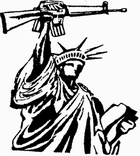Click Here to Puruse the old Flyover-press
Please Click ton Ab
Liberty knows no compromise
Click to Subscribe to Our Free Daily News Service
Donate today to help defray the costs of this important free newsletter
A Universal Ethic for All Mankind: A Detailed Review and Synopsis of The Ethics of Liberty
by Murray N. Rothbard
Chapter 22: The Nature of the State
Compiled and Edited
by
Dr. Jimmy T. (Gunny) LaBaume
What is the proper role of the State? Although it may perform many important and necessary functions, this in no way demonstrates that only the State can perform such functions, or even that it performs them well.
Suppose, there are competing cantaloupe stores in a neighborhood and one of the cantaloupe dealers uses violence to drive his competitors out and thereby establish a coerced monopoly. Does that mean that the use of violence is essential to the provision of cantaloupes? Of course not! In addition, any coercive monopolist will perform his service badly (in a costly and inefficient manner) since the consumers are deprived of any alternative choice.
The State is that hypothetical cantaloupe monopolist on a very large scale. It holds a compulsory monopoly over police and military services, the provision of law, judicial decision-making, the mint and the power to create money, control of unused land (“the public domain”), streets and highways, rivers and coastal waters, and the means of delivering mail among other thing.
Control of land and transportation provides an excellent method of overall control. Control of the money assures easy and rapid revenue. The monopoly of the postal service is a method for keeping an eye on the opposition. Historically, tight control over religion was through a mutually-supportive alliance with an Established Church. Now, the State relies on control of the levers of propaganda (the media especially).
Above all is the State's monopoly on the use of violence through the police and armed services and the courts. This is particularly important in enforcing all of the State's other powers, including the power to extract revenue by coercion.
All other persons and groups in society obtain their income voluntarily by selling goods and services or by gift. Taxation is nothing more than theft on a very large scale—the compulsory seizure of the property of the State's inhabitants (subjects).
State apologists maintain that taxation is “really” voluntary. But, the reality is that the State demands money at gunpoint. If the taxpayer refuses to pay, his assets are seized. Then, if he resist, he will be arrested or shot. The argument goes that taxation is “voluntary” because it is a method for everyone to make sure that everyone else pays for a unanimously desired project. But, this argument is greatly flawed.
The first flaw lies in the contradiction between voluntarism and coercion. A coercion of all-against-all does not automatically make the coercion “voluntary.”
Second, there is no way to assure that the tax levied is not more than the taxpayer would have paid voluntarily even if everyone else contributed. P recisely because taxation is compulsory, there is no way to be sure that the amount anyone contributes is what he would “really” be willing to pay.
Thirdly, the argument actually proves too much. Any service can be expanded by taxation. For example, suppose the Catholic Church were established through taxation. It would certainly be larger than if it relied on voluntary contributions but would that really be voluntary?
Fourthly, how can anyone know that everyone is “really” paying taxes voluntarily? Would the coerced payment to the Catholic Church by Protestants or atheists be “voluntary”?
Some hold that the act of voting in democratic governments makes the government and its powers “voluntary.” There are several fallacies with this. First, even if the majority endorsed every government act, this would simply amount to a tyranny of the majority tyranny. Murder is murder and theft is theft. It matters not whether they are committed by one man against another or by a group (even if it is the majority) of people within a given area. To believe otherwise, for example, would be to believe that the Jews murdered by the democratically elected Nazi government were not murdered, but “voluntarily committed suicide.” Secondly, people vote for “representatives” in a republic. But, in no legal sense are they truly “representatives.” In a free society, the principal hires a representative individually and can fire him if he wishes.
Furthermore, voting may not establish “majority” rule much less voluntary endorsement of government. For example, less than 40 percent of eligible voters bother to vote in the uS. Of these only 21 percent may vote for the winning candidate. That is hardly majority rule. But, taxes are levied on one and all, regardless of whether or not they voted for the winning candidate.
If taxation is compulsory, then it is therefore indistinguishable from theft. The State (which lives on taxation) is a vast criminal organization far more formidable and successful than any “private” Mafia. Mankind considers theft to be a crime. Franz Oppenheimer defined two ways of attaining wealth: 1) by production and voluntary exchange with others (e.g. the free market); and 2) by violent expropriation. The former benefits all parties involved and is called “the economic means.” The latter is the method of violence and theft. It parasitically benefits the looting group at the expense of the looted and is referred to as “the political means.” The State is the organization of the political means.
In contrast to the common thief, the State is generally enjoys legitimacy. The highwayman is not considered to be a legitimate member of society and the State is not considered a criminal organization. In fact, its minions are generally held in the highest status of society. This is a status that allows the State to feed off its victims while most of them actually support the exploitation. Why? In the past it has primarily been the function of ideologists to explain that, whereas theft by one person is criminal, when the State steals it is not theft but “taxation.” They have explained that murder by individuals is bad but when the State kills it should be called “war.” They explained how kidnapping or slavery is bad but when the State commits such acts we call it “conscription.”
Although, in our more secular age, the argument is more along the lines of “the public good” and the “general welfare,” the purpose is the same—to convince the public that the State is not a gigantic criminal organization but something necessary that must be supported and obeyed. Ideology is vital to the State because, if the bulk of the public believed that the State is nothing more than a bandit gang, it would soon collapse. Hence it is necessary that the State employ ideologists in the form of opinion-molding intellectuals. In earlier days this was the role of priests. Nowadays it is “scientific” and “value-free” economists and “national security managers” and others.
It is of particular importance for the State to control education. It controls universities through financial subventions and directly owned state schools. The public schools are controlled through certification requirements and compulsory attendance laws. Added to that is the State's virtually total control over radio and television either through outright State ownership or by the nationalization of the airwaves and the power of a federal commission to license.
In turn, intellectuals need the State because their services are often not very intensively desired by the mass of consumers. The State provides a more secure “market” which they often cannot obtain in voluntary exchange.
In summary, the State is a coercive criminal organization that lives on large-scale theft (taxation) and engineers the support of the majority (not everyone) through an alliance with opinion-molding intellectuals whom it rewards with a share of its power and booty.
Another aspect of the State is brought out with the implicit argument that the State really and properly owns the territorial area. If the State owns its territory, then it can make rules for anyone who lives in the area. It can also legitimately seize private property because there is no private property because, in turn, the State really owns the entire land surface. This theory makes the State a feudal overlord. The fact that new and un-owned resources are owned by the State (its “public domain”) is an expression of this implicit theory. But our homesteading theory demolishes such pretensions. By what earthly right do State criminals lay claim to the ownership of the land area?
So, the State: 1) acquires its revenue by physical coercion (taxation) and; 2) holds the compulsory monopoly of force and ultimate decision-making in an area. The first is theft on a grand scale while the second prohibits the voluntary purchase and sale of defense and judicial services.
The State does not merely use coercion to acquire revenue to hire propagandists and enforce its compulsory monopoly of services. It does many other things. For example, it often pushes its way into controlling the morality and the very daily lives of its subjects.
Conservatives often call for government to enforce their definitions of “morality (e.g. outlawing pornography). Our argument against such enforced morality is a sound one—e.g. no action can be considered “moral” if it is not freely chosen. But beyond that, it would be absolutely grotesque to entrust the public morality to the most extensive criminal (and hence the most immoral) group in society—the State.
Continue to the next chapter...
*Note: We hold no special government issued licenses or permits. We don't accept government subsidies, bailouts, low-cost loans, insurance, or other privileges. We don't lobby for laws that hurt our competitors. We actively oppose protectionism and invite all foreign competitors to try to under price us. We do not lobby for tariffs, quotas, or anti-dumping laws. We do not support the government's budget deficits: we hold no government or agency securities.
To Subscribe to our daily e-mail alert service, send an e-mail with the word "subscribe" on the subject line.
Visit Our Advertisers
Email for Advertising Rates
Use the link or send an email to: adinfo@flyover-press.com

